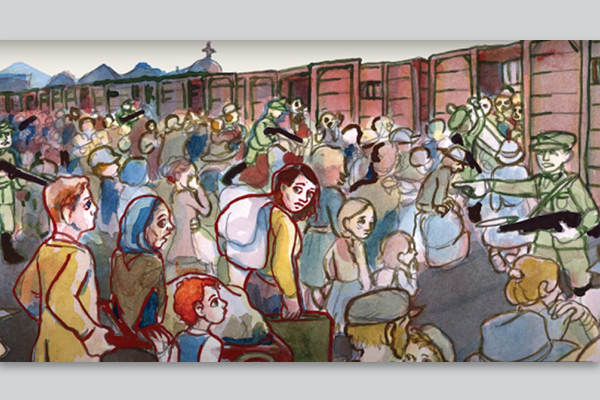
Illustration by Miriam Libicki for But I Live, Three Stories of Child Survivors of the Holocaust. Courtesy of the artist
Can graphic novels act as historical sources? Can they function as a form of witness testimony? What can a reader learn about someone’s personal experience through the comics medium? And how do visual arts communicate histories of persecution differently than other forms of survivor narratives and archival documents?
This panel will look at graphic narrative as an important form for the translation of witness testimony and survivor narrative. Exploring what graphic novels bring to discourses of genocide and human rights violations, this roundtable of artists and scholars will examine how the creation of comics and graphic novels on Nazi Germany, the Canadian Residential School System, and American Japanese Internment Camps help readers understand these historical events and their role in teaching on these topics.
Commentator
Biz Nijdam, Assistant Professor, Department of Central, Eastern, and Northern European Studies, University of British Columbia, Vancouver
Speakers
Natasha Donovan, Member, Métis Nation, Illustrator with a focus on comics and children's illustration
Kiku Hughes, Graphic Novelist, Cartoonist, and Illustrator, Seattle
Miriam Libicki, Nonfiction Comic Artist, Vancouver
Dr. Charlotte Schallié, Chair of the Department, Honours Advisor, and Professor, Germanic and Slavic Studies, University of Victoria, Victoria, British Columbia
This in-person or virtual discussion is free and open to the public. Registration is required.
For more information, contact Kierra Crago-Schneider at kcrago-schneider@ushmm.org.
This event was made possible in part through the generosity of the Curt C. and Else Silberman Foundation, supporting programs in higher education that promote, protect, and strengthen Jewish values in democracy, human rights, ethical leadership, and cultural pluralism.
The mission of the Jack, Joseph and Morton Mandel Center, part of the United States Holocaust Memorial Museum, is to ensure the long-term growth and vitality of Holocaust Studies. To do that, it is essential to provide opportunities for new generations of scholars. The vitality and the integrity of Holocaust Studies require openness, independence, and free inquiry, so that new ideas are generated and tested through peer review and public debate. The opinions of scholars expressed before, during, or after their activities with the Mandel Center do not represent and are not endorsed by the Mandel Center or the Museum.
